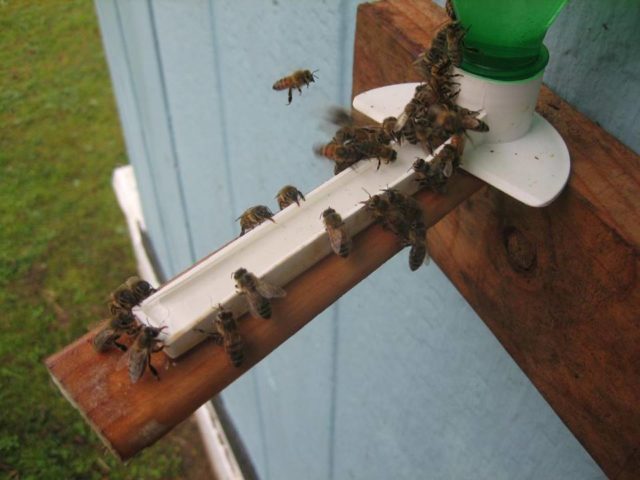Making the Most of a Bee Invasion
One of our team here at Four Flags Journal, Matt, has taken up beekeeping. Or at least is making an attempt to do so. And what was the inspiration?
It was not exactly planned. A stray colony of bees moved into the wall of one of his properties and set up housekeeping. Instead of spraying them with insecticide he decided to set them up in subsidized housing—in his own back yard.
You can see here the setup that Matt has placed on the outside of the bee-occupied wall. Looks almost like a cattle feeding trough, doesn’t it? Those little guys love it, like a bunch of little kids that got into the sugar bowl. This was a photo taken in the morning when there was a chill in the air. Later in the day there’s no place at the table with one bee rudely pushing another out of the way or trying to sit on top of his head. Matt has a hive prepared and the sugar syrup is intended to help them for a very shot time to settle in. He tells us that if they get free meals for very long they are inclined to become marauders that rob other hives. So they will soon be on their own again. The plan is, once they have built a nest, to take out the wall and move the bees, including the honeycomb and queen, to the hive, then wrap the hive up and move it to its designation—bees and all.
In researching the lifestyle of bees, one thing we found especially interesting is that they add enzymes, in the process of making the honey, that pickles or ferments it, making it very beneficial to our health through a probiotic effect. We have also heard of studies showing that local honey (not shipped in from another area) has helped overcome allergies. Which reminds us of what your editor likes to say: God always gets it right. Depart from the original plan and you’ll probably be sorry, sooner or later.
We don’t use sugar in our family since my recovery from cancer—and even before—for several reasons. Sugar paralyzes the immune system for four to six hours, causes cardiovascular disease, and for anyone just developing cancer, unknown to them, it goes right to and feeds a tumor. There is even a medical test for tumors wherein they inject sugar and watch to see where it goes. It will go right to a tumor if one is present.
But while we don’t use sugar, we do use some honey. We have long known that commercial beekeepers feed their bees sugar syrup. While we never kept bees before, it has been our policy for many years to try to find a local beekeeper from whom to buy honey. We always ask them if they feed their bees and always the commercial producers have said yes, but we are usually able to find a small farmer who does not supplement the bees but leaves adequate honey for them.
The reason bees store honey is that during the periods when nectar is in short supply, or nonexistent, they eat the honey. Commercial beekeeping operations get paid for honey so they take the honey to market and then subsidize the bees with sugar which, of course, is not nature’s way and compromises the value of the honey to the public. That’s why we avoid sugar-produced honey.
Most of our readers will know of the huge bee population die-off that has many worried since bees are important for pollination of crops. There are many theories about the cause of the die-off, but we have wondered. If sugar has such dire effects on the health of a human, is it possible it works similarly with bees? We don’t know—but we wonder.
Here is something else that is interesting. Honey bees are not native to either North or South America. They were brought over by the immigrants from the European continent. It strikes us as interesting what moving THAT colony of bees from Europe must have been like! But we also wonder . . . what was it that pollinated everything before the bees came from Europe? Hmmm . . .
While this interesting project was not planned, it fits right in to our philosophy of returning to the American way of dependence on ourselves—little by little diversifying our lives and being ever less dependent on a financial system that is failing.
We don’t think it imperative for you to produce your own honey, but if you are interested, we bought three books on the subject. We kind of overdid it, since only one would do. If bees interest you, we recommend a single, excellent book on the subject. Check out The Beekeeper’s Bible which you can see HERE. If you decide to try it, we hope you’ll let us all know how it goes. Don’t forget. We’re all in this together!
And stay tuned. When the time comes to try to capture and move this colony, we will be reporting back.
Until next time . . .
Arlean




Leave a Reply